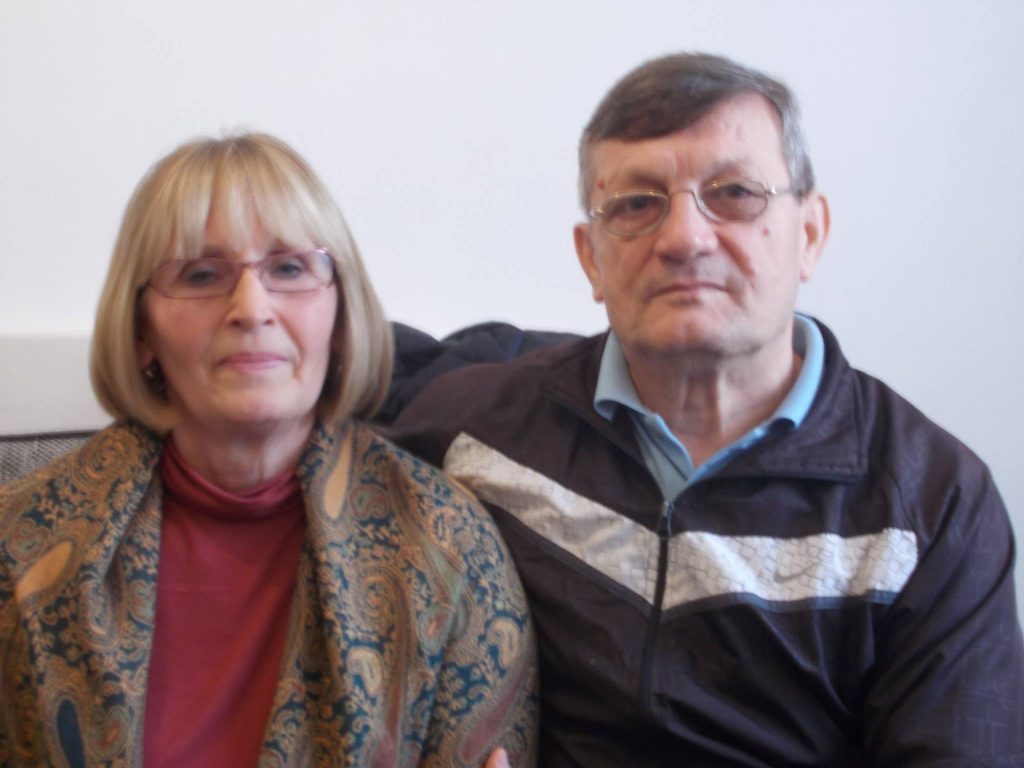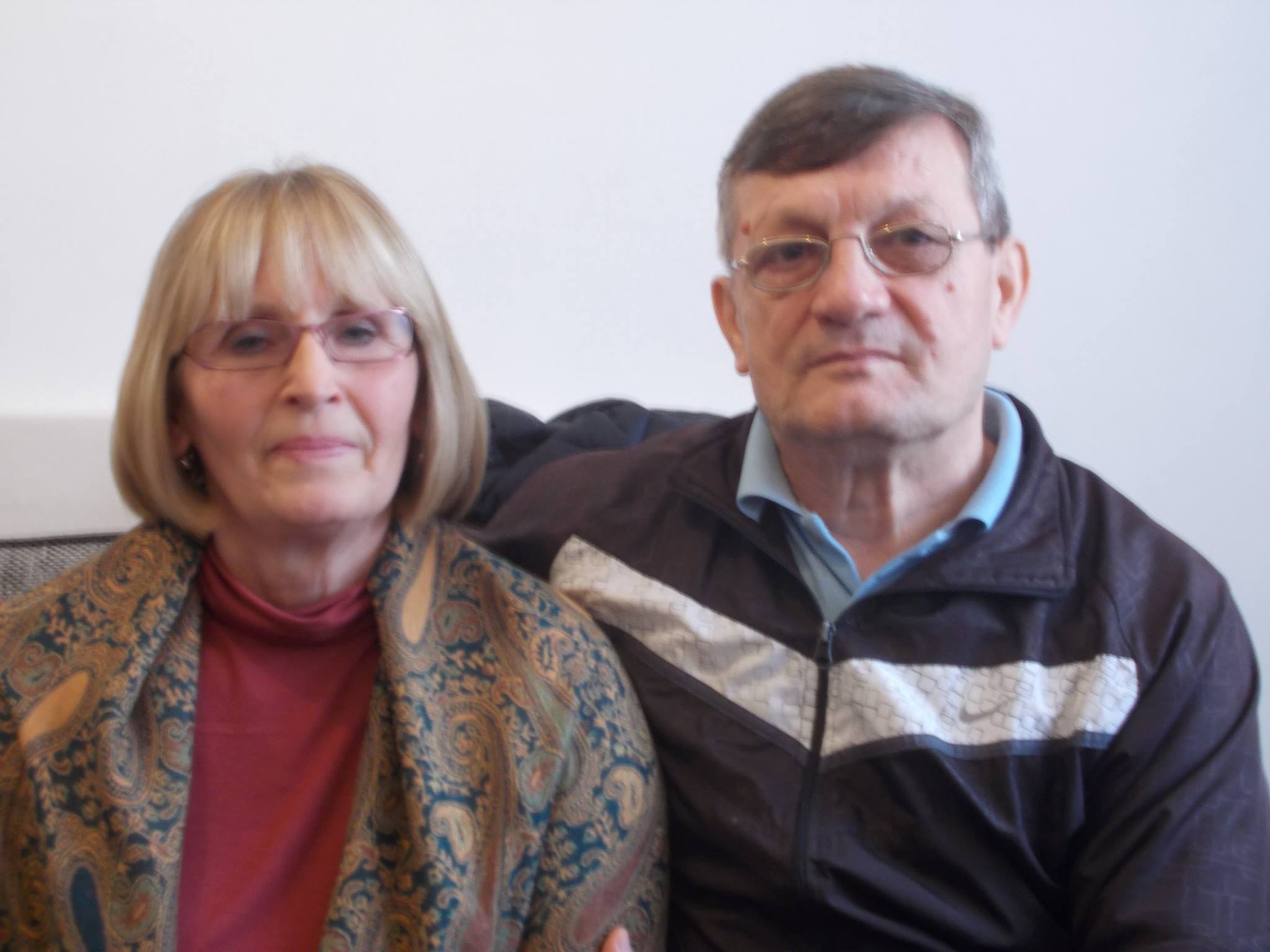Decency in Times of Evil

Honorable Mention
Maksim Marjanović, a retired teacher from the village of Skelani, risked his life to help his colleague Jakub Abdurahmanović and Jakub’s family. Jakub was murdered during the war in Bosnia-Herzegovina and, 20 years later, Maksim reunites with Jakub’s wife Šehida for the first time. Their emotional meeting accompanied by the memory of Jakub tell the story of the war in Bosnia and Herzegovina.
By Nevena Medić (25), Bratunac
Maksim and Jakub met each other when they studied together in Tuzla. Soon after, they began working together as teachers in Srebrenica.
When the war began, Šehida remembers how Jakub didn’t want to leave their apartment, insisting that he wasn’t guilty of any wrongdoing. She distinctly remembers her husband’s words: “If they kill me, they kill me.” Šehida recalls how she did not want to be separated from him because, in her words, life would mean nothing to her without him. Thus, they remained in the building, alone.
Maksim took special care of them during that time. When the phones were still working, Šehida remembers Maksim calling and saying: “Listen my Jakub, things are getting worse outside. Get your children Šehida ready. I am coming to get you.”

Maksim and Šehida Marjanović (photo: Nevena Medić)
Šehida remembers those days vividly and fleetingly comments that “it doesn’t matter who or ‘what’ you are. All that is important is that you are human.”
“Maksim arrived as darkness fell,” Šehida explains. “At first I didn’t recognize him because it was dark. Then he said to us: ‘Let’s go downstairs.’ We put what we needed into backpacks and went to Maksim’s apartment.”
“My children were so scared,” she remembers. “Whenever the doorbell rang they would jump up and ask: ‘Are they going kill us?’ I will never forget when we were in Maksim’s room and he took out a gun and said: ‘Listen, sweet Zijada, don’t cry. See Uncle Maksim’s gun? No matter who comes to our door, they cannot harm us. It’s just like in the cowboy movies, Zijada.’”
“She then hugged Maksim, feeling protected,” Šehida tells us.
Jakub’s Determination
According to Šehida, Maksim went to the town center to check on the situation. When he returned, he was visibly shaken. As he has passed through the town by car he had witnessed shootings all around him.
“The thought that someone would come to the apartment to make problems for Maksim, led Jakub to decide that we must return to our own home. Nothing could change his mind,” recalls Šehida. “My Jakub was known for setting his mind to something without any further explanation.”
Maksim reluctantly agreed to escort the family to their apartment.
“The days passed in fear and anxiety,” Šehida recounts. “The stores were looted. We were never sure what kind of evil awaited us just outside. At this point, a possible departure was out of the question.”
One morning, Maksim called and told Šehida to make coffee. “As soon as he arrived, he began crying,” remembers Šehida. He spoke with her husband, saying, ‘You know what, Jakub? I am a decent man. I taught my children a different set of values. I am ashamed to be seen in this uniform. This would only be an honourable uniform, if I were at least able to protect you and the people with whom I have spent my life. I have decided that I must go back to my village of Brežani. If I must, I will die there.’
Maksim offered Šehida the key to his apartment. He told her: ‘If you feel more protected there, then go, but I have to leave.’ He embraced Šehida’s children and cried. “He probably sensed the evil that was to come,” adds Šehida as she recounts that moment.
She remembers Maksim telling Jakub: “If we stay alive and meet again, we will know who was truly responsible for all this. I really have to go now.” He then left and Šehida, who followed him across the playground, recollects how he put his hand over his face and cried.
A few days after the separation, Šehida remembers how Arkan’s “Tigers” entered their apartment to search it. “They opened everything in the apartment, but found nothing. One of them yelled: ‘Everybody get up!’ My son Zijo, who was in his second year of high school at the time, let out a distinct cry. Then, they removed my Jakub. In a Serbian dialect, one of the Tigers said: ‘You! Sit with the children!’ So, we stayed behind in the apartment.”
Shortly thereafter, Šehida received the news that Jakub had been killed.
“I hadn’t bathed in 10 days. When I took off my clothes to take a bath,” she explains, “I saw that my thighs were covered in bruises. I realized that my child Zijada had pinched my legs out of fear and I didn’t even notice it. It was then that I understood the trauma she was going through.”
Šehida had not seen Maksim since 1992 but explains that they still knew everything about each other. “Maybe he is fishing on the Drina,” she mused.
When Šehida told us her tragic story, we decided to find Maksim and contact him. When we found him, he was happy to hear from us. He asked us to bring Šehida to him because he didn’t want to return to Srebrenica. He believed that the people he spent the good parts of his life with no longer lived there.
We Never Wanted This
As we approach Maksim’s house, I hear Šehida breathing heavily. Maksim is waiting for us out front. He says: “Look at my Šehida, she is the same. You are just as I left you, you haven’t changed one bit.”
During Maksim and Šehida’s first coffee after all those years, they begin to recount tales of child’s play, first loves, and fights. They mostly speak of their sons Zoran and Zijad. “Those kids were inseparable,” they say.
Šehida also remembers the letters Zoran sent to Zijad. She comments that these letters can be a lesson to younger generations.
“Once we received a letter from Zoran via the Red Cross,” she tells us. “I was surprised by the fact that some messages were not censored. They used to cross out what they did not approve of with black ink. Zoran told my Zijo: “I am sending you this letter, but I don’t know if you will read it. If it does reach you, know that I am the old Zoran. I haven’t changed. I know that you and I never wanted this.’”
The duo sits together motionless. Their eyes are full of tears. For the first time, Maksim listens to the story of how his friend was killed. Šehida describes the night Jakub was murdered. She and the children spent the whole night on the roof of a school in Srebrenica. They didn’t sleep all night. In the early morning, they went to the hills above Srebrenica. They found accommodation in the first village they came to. Accommodation was easy to acquire, according to Šehida, because everyone knew Jakub.
“Something kept me restless. I had to go. I had to find him and try to bury him. I couldn’t stop thinking that dogs would rip him apart,” she says.
Šehida remembers that when she returned to Srebrenica it was “abandoned, without birds, and without people”. She says she did not feel any fear or sorrow when she buried her husband because she was in shock.

Šehida Marjanović (photo: Nevena Medić)
“I was going down the street and there were no birds or plants. Nothing existed. Cars were parked on the road with all of their doors open. All the Serbs had fled when Goran Zekić [Member of the Bosnian Serb Republic and the Personnel Commission of the Social Democratic Party] was murdered. I thought my Jakub was killed in front of Srebrenica’s department store, but people told me that he was murdered in a basement.”
“We went to the police station. Muniba told me to go down the stairs and I felt like I couldn’t breathe. I reached for the door but I couldn’t open it. It was locked. I turned around and told Muhamed, the man who had been helping us, “I can’t open the door, but I can see Jakub’s shoes.” He opened the door. At first, I couldn’t look. Then I quickly turned around. What I saw was a relief – he hadn’t been butchered,” says Šehida.
She explains to Maksim that after she buried him, it was easier for her. However, as she recalled these memories, there was a moment when she was not able to speak or get enough air. Šehida believes that, if it hadn’t been for her children, she could have never gone back to the village. She tells Maksim that she probably would have thrown herself off of something.
Maksim and Šehida remember more than just the bad times, though. They begin reminiscing about the good times as well. They speak of school days and hanging out. While on the subject of school, Maksim comments that teachers should never be nationalists or chauvinists. “Back then, it never occurred to me to make distinctions between children,” he says.
Maksim goes on to explain the internal pull he felt to help Šehida’s family. “I thought helping others was the human thing to do. Once, when I saw Jakub at the police station, I told him I would keep him safe. I told some police officers nearby to call me if those bastards came through. Even today, I remember their fingerless gloves. I later realized they were just ordinary criminals,” recalls Maksim.
As Maksim describes the war in Bosnia, he states: “War is like a flood. When it hits, all the trash floats to surface. All the decent people retreat. The trash stays afloat and, as long as it surrounds us, we cannot wash our hands of it.”
According to Maksim, everyone could anticipate that there would be a war. Even his students, who often asked silly questions, could feel that something was coming. “Children see everything,” Maksim says. “My student Sabina asked me: ‘Teacher, will there be a war?’ Although I knew the answer, I told her: ‘No my children, there will be no war. If, God forbid, there was a war, I only ask that you do one thing—take care of and support each other. Don’t allow national interests to create rifts between you. Help one another. This is what is most important. Only in this way will you be able to save yourselves and others.’”

